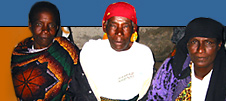|
||
 |

|
 |
|
|
I Dream of Peace - A Future Search for the Children of Southern Sudan.
The Adult Conference Once the adult participants understood the rationale of the conference and how it was going to be different from traditional meetings, they threw themselves into the tasks. Given the deeply painful past they all shared, which included bitter conflicts between some of the different ethnic groups in the room, the ease with which they focused was impressive.
One impressive story was related by the stakeholder group of tribal chiefs. Looking striking in their traditional custumes and using three different languages to communicate with each other, the chiefs told of the attempts they are making to forge reconciliation between the Dinka and Nuer tribes. The dream of the future for children created by the main conference was striking in its similarity to the dream of the children. Peace and reconciliation came out very strongly, as did the pressing need for education and health services. The adults also identified one other issue which for them is key to securing a better future for Southern Sudan's children: good governance, with accountable structures respecting human rights. Outcomes UNICEF hopes that these future searches will mark the start of a process that will place the lives of all Southern Sudan's children outside the context of political differences, and allow everyone to make a contribution to improve their lives. At the conference, Sudanese living outside Sudan (expatriates from the UK, and South and West Africa) joined in the plan to develop curriculum material and deliver textbooks to villages over the next two years. Another task force said it would identify community members inside Sudan with existing teaching skills. A third group talked about training courses for agriculturists and farmers, while the health care professionals collaborated to work with local citizens to erect buildings to be used as centers. The children formed groups and talked about what they wanted to tell people back home about their experience in Nairobi and the kinds of gatherings they could arrange. On a personal note, one boy, from Yambio was recognized by one of the adult participants, who told him his mother was alive and well and living in Khartoum. Subsequently, UNICEF arranged for him to send a letter to her and she replied to him - the first contact between them since they were separated by war10 years ago. |
|
|
|
home | introducing
the method | what is future search? | conditions for success | methodology |